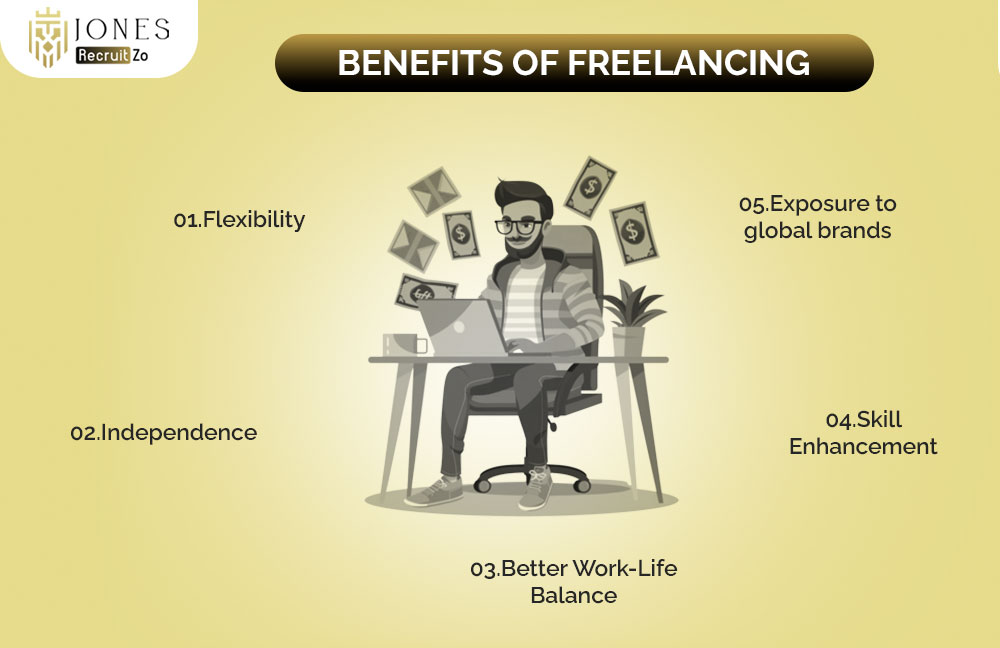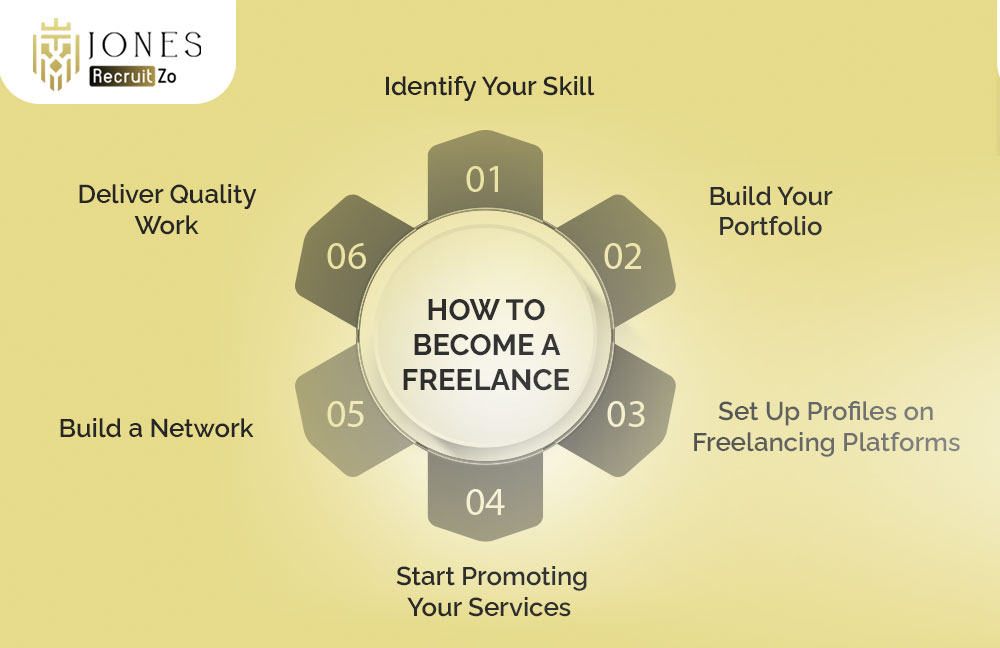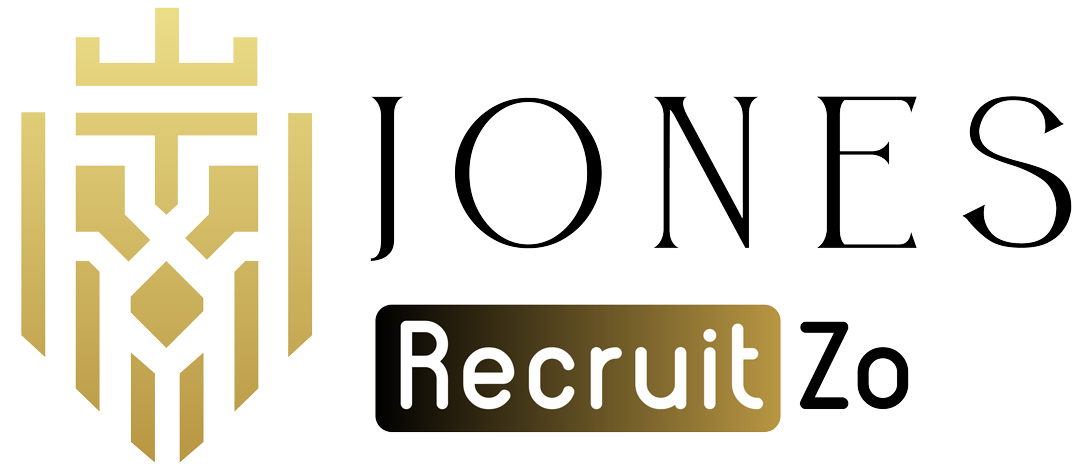What is Freelancing?
Freelancing is a work arrangement where individuals offer their skills and services to clients or companies on a project or contract basis rather than being employed full-time. These professionals—known as freelancers— are essentially self-employed and have the flexibility to work with multiple clients across various industries. Most of the time, these workers transport their skills and work independently, setting their working hours and choosing the projects they work on.
Freelance jobs can be performed anywhere, thus offering tremendous flexibility and variety for those who desire it. With the existence of platforms that connect people to remote work, this kind of work has grown a lot in the Indian subcontinent and abroad. From content writing and graphic designing to software development and consulting, freelancing has given bright minds a potential way to monetise their grey matter.
Benefits of freelancing

Freelancing comes with a unique set of advantages that appeal to professionals across industries. Here’s how it can benefit your career and lifestyle:
-
Flexibility
Freelancers are free to work whenever, wherever, and however they wish. Restoration of schedule control allows the person to plan the day according to his will, be it working in hours of productivity or upholding commitments on a personal level without swallowing their professional relevance.
-
Independence
Being one’s own boss means having power over the projects you decide to take on, your clients, and the direction of your career. This independence helps freelancers to mould their professional journey and build a business according to their goals.
-
Better Work-Life Balance
As freelancers get to control their own amount of work, they are therefore able to create a schedule that suits them in balancing their personal life and family needs. This usually goes hand in hand with lowered stress levels and a good state of mental health, which collectively lead to well-being and job satisfaction.
-
Skill Enhancement
Freelancers go through various projects, industries, and clients. These exposures continue to nurture landing skills in them toward developing a broader skill set, which gives them versatility to compete in the market.
-
Exposure to global brands
Freelancing gives you the chance to establish clients from international waters and global companies. It is an opportunity for one to learn much from cultural perspective, professionalism, and industry practices apart from enhancing the portfolio.
How Does Freelancing Work?
Understanding how freelancing operates helps new freelancers navigate their careers effectively. The process is typically straightforward and follows these key steps:
-
Finding Clients
Finding and securing clients can be said to be one among the most pivotal aspects of freelancing. Usually, it starts by building visibility for the created portfolio or by showcasing one’s expertise while engaging with an audience worth engaging. A strong reputation built in the niche can be of real help in bringing in word of mouth clients, the ones reached through networking, or sharing information content.
Steadfast effort, coupled with churning out excellent results, helps a freelancer to develop a degree of trust and client base so willing that it finds entry into repeat jobs or referrals.
-
Proposal & Agreement
Once an appropriate project is found, the freelancer submits a proposal describing the scope of work involved, including the time required and the proposed charges. When the client agrees, a legally binding contract should be signed by both parties to avoid confusion.
-
Completing Work
After finalising the contract, the freelancer proceeds to do the job based on the brief from the client and the client’s expectations. The freelancer regularly maintains two-way communication and either milestone or progress updates with the client, ensuring that the client is satisfied throughout the process.
-
Get Paid Promptly
Once the work is completed and approved by the client, the payment is due. This is done by the freelancer issuing an invoice from his side. Payments are made through the use of online payment or merchant gateways, wire transfers by telephone, or a default display-to-show system that platforms set up for contracts between freelancers and clients. These timely invoices and payment terms embedded in the contract ensure swift payments.
How to Become a Freelancer?

Starting a freelancing career involves preparation, persistence, and positioning. Here’s how to begin:
-
Identify Your Skill
First, you analyse all your good skills, whether writing, designing, coding, or editing. The clearer you are in your niche, the easier it will be to attract the right clients and build your profile.
-
Build Your Portfolio
Before clients will trust you with their projects, they want to see proof of what you have done. Organise a portfolio with your best samples showcasing your skills, creativity, and quality of work.
-
Set Up Profiles on Freelancing Platforms
Create an account with sites that resonate with your skill or expertise. A complete profile will build resistance to your credibility and visibility: Add a picture, a professional summary, unusual skills, rates, and a portfolio.
-
Start Promoting Your Services
Promote your services across social sites or networks, personal blogs, or websites. Share your knowledge through content and join groups related to your field for outreach and authority.
-
Build a Network
Freelancing is based on relations. Connect with fellow freelancers, prospective clients, and industry executives. The stronger your network, the more referrals and long-term engagements come your way.
-
Deliver Quality Work
Client satisfaction is the key to making a freelancer successful. Depending on deadlines, communication, and quality work from your end makes your name known for more business and repeat work.
Common Freelancing Jobs

Freelancers can be found across a wide range of professions. Some of the most in-demand freelancing roles include:
-
Content Writer / Copywriter
Writers write articles or blogs, product descriptions, and even marketing advertising; they put in clear, thoroughly engaging content that is also SEO optimised for driving traffic and brand awareness.
-
Graphic Designer
These professionals will carry out processes which may range from logo creation to social media graphics or even web design and branding material. Creativity is important in this field, as is a strong portfolio.
-
Web Developer
Developers build or maintain websites and applications. It usually requires knowledge of programming languages, such as HTML, CSS, and JavaScript, and frameworks that may include React and Laravel.
-
Video Editor
Helping the brands and content creators of today become video editors is to trim the footage, add effects, and beautify the videos aimed at YouTube, Instagram, and digital ads!
FAQs
1) What is freelancing?
Freelancing is a kind of self-employment where the person offers his services on a per-project basis for a client or companies. It allows you more control over what you do for work, greater flexibility on working hours, and an opportunity to work for different clients.
2) What are the advantages of freelancing?
The freelancer looks for clients, establishes the conditions relating to a project with the client, carries out the work as agreed, and gets paid upon delivery of the product/service. It is carried out smoothly through mechanisms such as platform communication, contracts, and clear project guidelines.
3) How Does Freelancing Work?
Freelancers find clients, agree on project terms, complete the work as outlined, and receive payment after delivery. Platforms, contracts, and clear communication ensure smooth operations throughout the project lifecycle.
4) How to Become a Freelancer?
To become a freelancer, start with your skills and knowledge, portfolio, and location accounts on freelance portals. Start attracting services and potential clients and focus keenly on excellent delivery.















